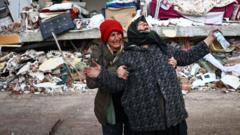Ongoing military exchanges between Israel and Iran have marked the most severe battles in years, with both nations launching extensive attacks. The situation escalates amidst international calls for de-escalation and a growing fear of a larger conflict involving global powers.
Escalation Continues as Israel and Iran Exchange Renewed Strikes Amid War Concerns

Escalation Continues as Israel and Iran Exchange Renewed Strikes Amid War Concerns
Intense violence erupted between Israel and Iran, breaking decades-long tensions and raising fears of a regional conflict.
June 14, 2025, 9:53 a.m. ET
In a worrying escalation reminiscent of past conflicts, Israel and Iran engaged in fierce military exchanges, with both sides conducting extensive attacks over the weekend. Sirens echoed in major cities, sending residents to seek safety in bomb shelters as reports of casualties began to mount.
Israeli forces carried out numerous strikes targeting military assets and nuclear facilities in Iran, claiming responsibility for over 70 fatalities, including key military figures. Simultaneously, Iran retaliated with barrages of ballistic missile fire, resulting in injuries and deaths in Israeli cities like Tel Aviv and Ramat Gan, where residential areas have been severely damaged.
“This is the most intense fighting between Israel and Iran seen in decades,” stated Israeli defense officials, expressing concerns that the ongoing conflict could embroil the United States and other nations. The violence intensified as Israel attacked crucial parts of Iran’s military infrastructure, which, as reported, include sensitive nuclear sites.
As the conflict escalated, diplomatic negotiations regarding Iran’s nuclear program, which have been anticipated to occur soon in Oman, faced uncertainty. Iranian officials communicated that they would not engage in talks while Israel continued its offensive.
Caught in this crossfire, the Palestinian territories, particularly the West Bank, also felt the repercussions. Many Palestinians lack adequate protective measures against incoming missiles, leaving them vulnerable as tensions rise. Reports indicate incidents of injuries and infrastructure damage from debris caused by missile strikes.
The recent barrage saw approximately 150 Israeli airstrikes over two days, as 200 Iranian missiles were reportedly launched towards Israeli territory, raising alarms far beyond the immediate conflict zone. With fear and tensions mounting on both sides, the international community watches closely, urging both nations to reconsider their aggressive postures.
In a display of defiance, Iran's leadership vowed to retaliate, warning that any nation involved in supporting Israeli efforts would face repercussions. Amidst the chaos, social media reflections reveal a populace deeply shaken, expressing fear and anger as cities echo with the sounds of war and destruction.
As this conflict unfolds, analysts suggest that the stakes could rise significantly, with the potential for broader regional destabilization if diplomatic solutions aren't urgently pursued.
In a worrying escalation reminiscent of past conflicts, Israel and Iran engaged in fierce military exchanges, with both sides conducting extensive attacks over the weekend. Sirens echoed in major cities, sending residents to seek safety in bomb shelters as reports of casualties began to mount.
Israeli forces carried out numerous strikes targeting military assets and nuclear facilities in Iran, claiming responsibility for over 70 fatalities, including key military figures. Simultaneously, Iran retaliated with barrages of ballistic missile fire, resulting in injuries and deaths in Israeli cities like Tel Aviv and Ramat Gan, where residential areas have been severely damaged.
“This is the most intense fighting between Israel and Iran seen in decades,” stated Israeli defense officials, expressing concerns that the ongoing conflict could embroil the United States and other nations. The violence intensified as Israel attacked crucial parts of Iran’s military infrastructure, which, as reported, include sensitive nuclear sites.
As the conflict escalated, diplomatic negotiations regarding Iran’s nuclear program, which have been anticipated to occur soon in Oman, faced uncertainty. Iranian officials communicated that they would not engage in talks while Israel continued its offensive.
Caught in this crossfire, the Palestinian territories, particularly the West Bank, also felt the repercussions. Many Palestinians lack adequate protective measures against incoming missiles, leaving them vulnerable as tensions rise. Reports indicate incidents of injuries and infrastructure damage from debris caused by missile strikes.
The recent barrage saw approximately 150 Israeli airstrikes over two days, as 200 Iranian missiles were reportedly launched towards Israeli territory, raising alarms far beyond the immediate conflict zone. With fear and tensions mounting on both sides, the international community watches closely, urging both nations to reconsider their aggressive postures.
In a display of defiance, Iran's leadership vowed to retaliate, warning that any nation involved in supporting Israeli efforts would face repercussions. Amidst the chaos, social media reflections reveal a populace deeply shaken, expressing fear and anger as cities echo with the sounds of war and destruction.
As this conflict unfolds, analysts suggest that the stakes could rise significantly, with the potential for broader regional destabilization if diplomatic solutions aren't urgently pursued.




















